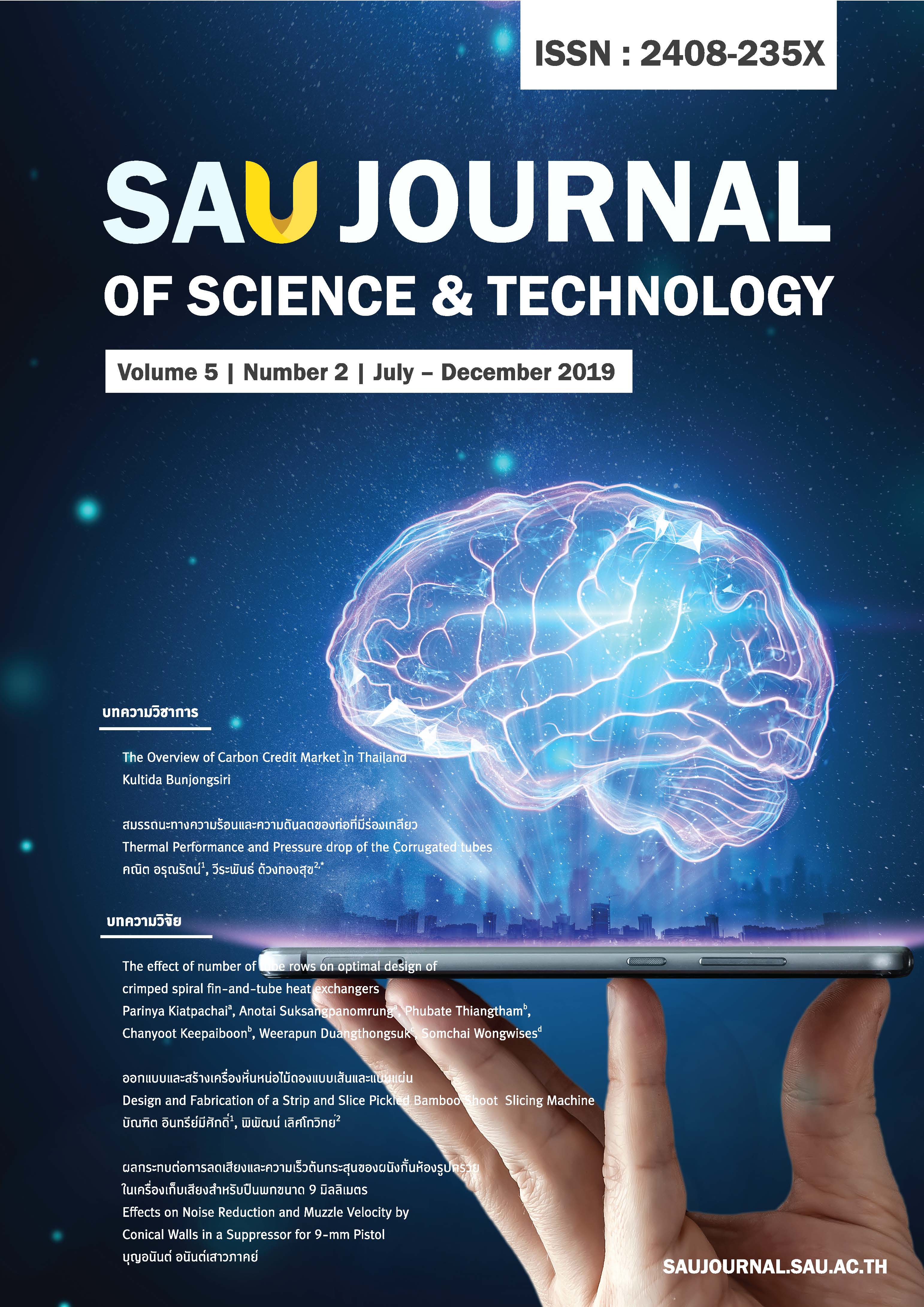Thermal Performance and Pressure drop of the Corrugated tubes Thermal Performance and Pressure drop of the Corrugated tubes
Main Article Content
Abstract
The corrugated tube enhances the heat transfer by generating secondary flow, promoting fluid turbulence, and increasing the heat transfer area. The corrugated tube can be used instead of smooth tube in all types of heat exchanger. As a result, the thermal performance of heat exchanger can be improved. The geometric factors affecting on the heat transfer and pressure drop of this tube are the corrugation pitch, helix angle, corrugation depth, and number of start. For the single-phase flow, the experiments were conducted at the Reynolds number between 100 and 100,000. The test fluids were water, air, oil, and ethylene glycol. The values of Nusselt number ratio were between 1 and 4.7 and the friction factor ratio were between 1.05 and 15. In case of two-phase flow, the test fluids were R-22, R407C, R-134a and R-404a. The results showed that the corrugated tube increases the heat transfer coefficient and the frictional pressure drop in the range of 5-100 and 10-300% compared to that of smooth tube, respectively.
Article Details
References
[2] S. Ganeshan, M.R. Rao, 1982, Studies on thermohydraulics of single-and multi-start spirally corrugated tubes for water and time-independent power law fluids, Int. J. Heat Mass Transfer 25, 1013–1022.
[3] X. Chen, X. Xu, S. Nguang, A.E. Bergles, 2001, Characterization of the effect of corrugation angles on hydrodynamic and heat transfer performance of four-start spiral tubes, ASME J. Heat Transfer 123, 1149–1158.
[4] S. Rainieri, G. Pagliarini, 2002, Convective Heat Transfer to Temperature Dependent Property Fluids in the Entry Region of Corrugated Tubes, Int. J. Heat Mass Transfer 45, 4525-4536.
[5] Y. Dong, L. Huixiong, C. Tingkuan, 2001, Pressure Drop, Heat Transfer and Performance of Single Phase Turbulent Flow in Spirally Corrugated Tubes, Exp. Therm. Fluid Sci. 24, 131-138.
[6] A. Barba, S. Rainieri, M. Spica, 2002, Heat Transfer Enhancement in a Corrugated Tube, Int. Comm. Heat Mass Transfer 29(3), 313-322.
[7] P.G. Vicente, A. Garcia, A. Viedma, 2004, Mixed Convection Heat Transfer and Isothermal Pressure Drop in Corrugated Tubes for Laminar and Transition Flow, Int. Comm. Heat Mass Transfer 31(5), 651-662.
[8] S. Pethkool, S. Eiamsa-Ard, S. Kwankaomeng, P. Promvonge, 2011, Turbulent heat transfer enhancement in a heat exchanger using helically corrugated tube, Int. Commun. Heat Mass Transfer 38, 340–347.
[9] J. F. Seara, F.J. Uhía, 2012, Heat transfer and friction characteristics of spirally corrugated tubes for outer ammonia condensation, Int. J. Refrig. 35, 2022–2032.
[10] A. Garcia, J. Solano, P. Vicente, A. Viedma, 2012, The influence of artificial roughness shape on heat transfer enhancement: corrugated tubes, dimpled tubes and wire coils, Appl. Thermal Eng. 35, 196–201.
[11] A. A. R. Darzi, M. Farhadi, K. Sedighi, 2014, Experimental investigation of convective heat transfer and friction factor of Al2o3/water nanofluid in helically corrugated tube, Exp. Thermal Fluid Science 57, 188–199.
[12] A. Harleß, E. Franz, M. Breuer, 2016, Experimental investigation of heat transfer and friction characteristic of fully developed gas flow in single-start and three-start corrugated tubes, International Journal of Heat and Mass Transfer 103, 538–547.
[13] A. Harleß, E. Franz, M. Breuer, 2017, Heat transfer and friction characteristics of fully developed gas flow in cross-corrugated tubes, International Journal of Heat and Mass Transfer 107, 1076–1084.
[14] M. Sun, M. Zeng, 2018, Investigation on turbulent flow and heat transfer characteristics and technical economy of corrugated tube, Applied Thermal Engineering 129, 1–11.
[15] F. Andrade, A.S. Moita, A. Nikulin, A. L. N. Moreira, H. Santos, 2019, Experimental investigation on heat transfer and pressure drop of internal flow in corrugated tubes, International Journal of Heat and Mass Transfer 140, 940–955.
[16] P. Thors, J. Bogart, 1994, In Tube Evaporation of HCFC-22 with Enhanced Tubes, J. Enhanced Heat Transfer 1, 365–377.
[17] W. Targanski, T.J. Cieslinski, 2007, Evaporation of R407C/Oil Mixtures inside Corrugated and Micro-Fin Tubes, Appl. Therm. Eng. 27(13), 2226-2232.
[18] S. Laohalertdecha, S. Wongwises, 2010, The effects of corrugation pitch on the condensation heat transfer coefficient and pressure drop of R-134a inside horizontal corrugated tube, International Journal of Heat and Mass Transfer 53, 2924-2931.
[19] S. Laohalertdecha, S. Wongwises, 2011, Condensation heat transfer and flow characteristics of R-134a flowing through corrugated tubes, International Journal of Heat and Mass Transfer 54, 2673–2682.
[20] S. Laohalertdecha, S. Wongwises, 2011, An experimental study into the evaporation heat transfer and flow characteristics of R-134a refrigerant flowing through corrugated tubes, International Journal of Refrigeration 34, 280-291.
[21] S. Laohalertdecha, A. S. Dalkilic, S. Wongwises, 2011, Correlations for evaporation heat transfer coefficient and two-phase friction factor for R-134a flowing through horizontal corrugated tubes, International Communications in Heat and Mass Transfer 38, 1406-1413.
[22] K. Aroonrat, S. Wongwises, 2011, Evaporation heat transfer and friction characteristics of R-134a flowing downward in a vertical corrugated tube, Experimental Thermal and Fluid Science 35, 20-28.
[23] K. Aroonrat, A. S. Dalkilic, S. Wongwises, 2013, Experimental study on evaporative heat transfer and pressure drop of R-134a flowing downward through vertical corrugated tubes with different corrugation pitches, Experimental Heat Transfer 26, 41-63.
[24] D. Khoeini, M.A. Akhavan-Behabadi, A. Saboonchi, 2012, Experimental study of condensation heat transfer of R-134a flow in corrugated tubes with different inclinations, International Communications in Heat and Mass Transfer 39, 138–143.
[25] S. Yarmohammadi, M. Farhadi, 2016, Optimization of thermal and flow characteristics of R-404A vapor condensation inside corrugated tubes, Experimental Thermal and Fluid Science 79, 1–12.


